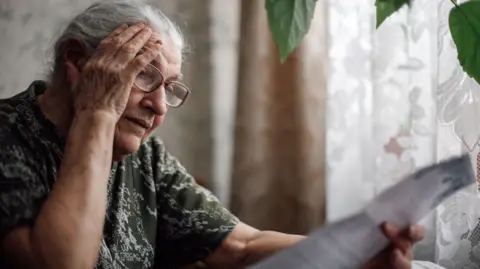Winter fuel cut to put 50,000 into poverty next year
 Getty Images
Getty ImagesAn additional 50,000 pensioners will be living in relative poverty next year as a result of cuts to the winter fuel payment, the government's own estimates have revealed.
Earlier this year, Chancellor Rachel Reeves announced the £300 payment would be restricted to all but the poorest pensioners - those eligible for pension credit.
In a bid to soften the impact of the cuts, the government launched a campaign to encourage eligible pensioners to apply for pension credit.
In a letter clarifying the figures, Work and Pensions Secretary Liz Kendall said the estimates did not take into account any increased take-up of pension credit.
According to the estimates provided by the government, in the years ending March 2025, March 2026 and March 2028 there will be an additional 50,000 pensioners in relative poverty after housing costs.
In the years ending March 2027, March 2029 and March 2030 an additional 100,000 pensioners would be in relative poverty after housing costs.
The annual figures are rounded to the nearest 50,000. Kendall said this meant "small variations in the underlying numbers impacted can lead to much larger changes in the rounded headline numbers".
The cumulative total over the years does not necessarily refer to individual pensioners, who could move in and out of relative poverty over time depending on their personal circumstances.
Currently the government estimates 1.9 million pensioners - around 15% - are in relative poverty.
The new estimates, published on Tuesday, suggest the cuts to the winter fuel payment would increase pensioner poverty by 0.5 percentage points.
A person is considered to be living in relative poverty if they have less than 60% of the median income.
In her letter, Kendall said the work and pensions department had written to 120,000 pensioners to encourage them to claim the pension credit to which they may be entitled.
She added that the decision to cut the winter fuel payment was "not a decision this government wanted or expected to take".
"However, we were forced to take difficult decisions to balance the books in light of the £22bn black hole we inherited.
"Given the dire state of the public finances, it’s right that we target support to those who need it most."
Helen Whately, the Conservatives' shadow work and pensions secretary, said: "Finally the dam breaks and we get to see what Labour have known all along.
"Their winter fuel payment cuts are going to plunge 100,000 pensioners into poverty in the next few years.
"Clearly Keir Starmer feels like that's a price worth paying to make a political point. But I don't think those pensioners would agree with him."
Daisy Cooper, the Liberal Democrats' Treasury spokesperson, said: “While the Conservatives undoubtedly left this government a dire fiscal inheritance, that's no excuse to push more pensioners into poverty as the temperature plummets."
During a press conference in Brazil, where the prime minister is currently attending a G20 summit, Sir Keir Starmer was asked about the figures.
He said that the state pension would rise by £470 in the spring and that pensioners would be better off.
Earlier in the day, Scottish Labour leader Anas Sarwar diverged from Sir Keir by pledging to increase eligibility for pension credit if they formed the next government.

Sign up for our Politics Essential newsletter to read top political analysis, gain insight from across the UK and stay up to speed with the big moments. It’ll be delivered straight to your inbox every weekday.
